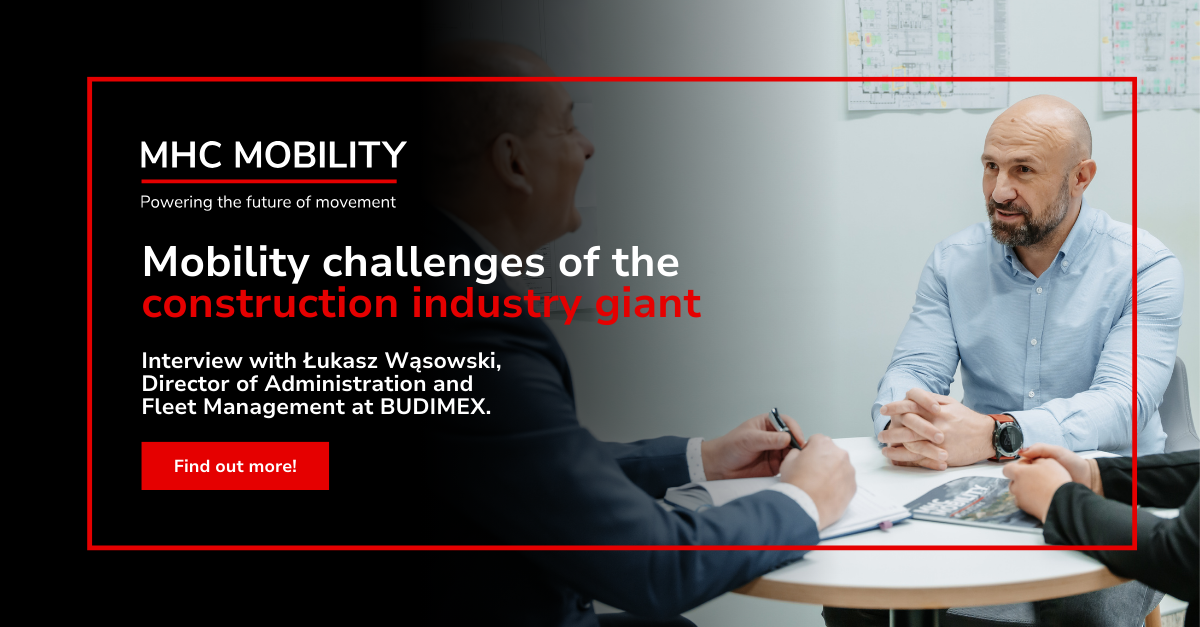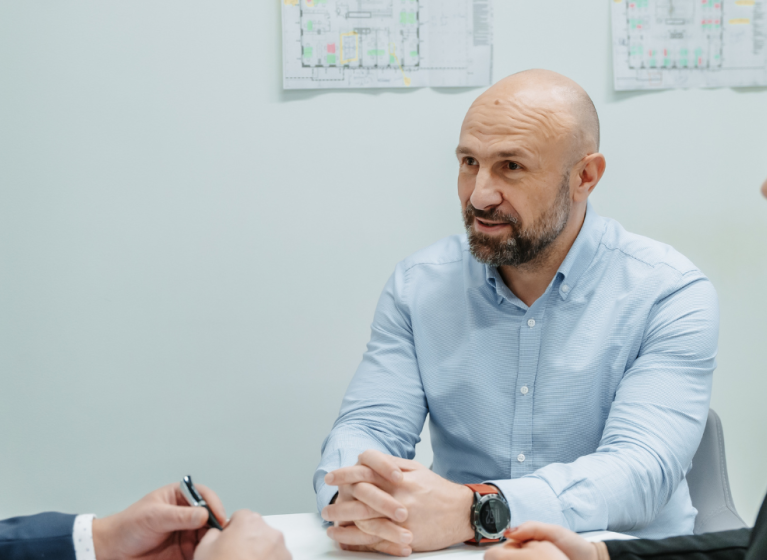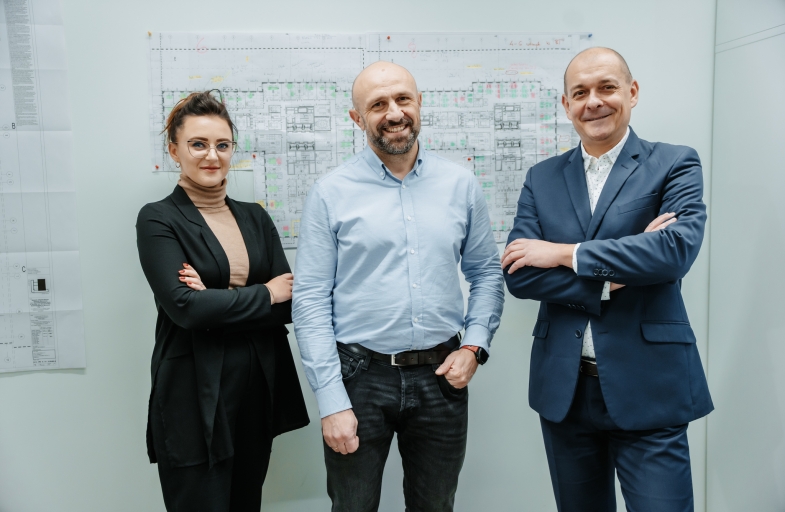Budimex, a leading construction company, is testing modern fleet management strategies, including flexible time solutions. We talk to Łukasz Wąsowski, Director of Administration and Fleet Management, about the key elements of effective management of a large fleet, challenges of electromobility, and the company's commitments in the context of sustainable development.
- What elements do you consider crucial in effectively managing such a significant fleet of vehicles as operated by Budimex?
In large vehicle fleets, where the vehicle lifecycle is 3-5 years, the key process is vehicle replacement. Both the fleet size and the standards of the vehicle policy within the organization make replacement a constant duty of the management team members. The human factor plays a crucial role, and the lack of necessary competencies can jeopardize the success of this ongoing logistical operation. It is also worth emphasizing the importance of a policy based on thoughtful principles, meeting the requirements of the construction industry, and tailored to the company's needs. It constitutes a significant foundation upon which all other processes are based.
Another essential element without which managing Budimex's fleet could not function is efficient, flexible, and experienced contractors. Each subsequent link, such as the manufacturer, dealer, financier, or even the company applying the company's logos to the vehicles, contributes to the final result, which is the mobility of employees. All of this is part of a larger puzzle necessary for conducting business and providing tools for the timely, contract-compliant execution of contracts by our company.
The unpredictability of production in recent years and the associated problems have caused countless challenges within the entire automotive industry. This also forced fleet operators to seek non-standard solutions. It is obvious that with larger fleets, these problems were visible like nowhere else. However, I hope that this is behind us now, and similar turbulence will not occur in the coming years.
- Are there any special requirements that are important to you regarding fleet management?
I think there are several services and products that support our processes to varying degrees. We certainly make use of the most practical ones, which are now becoming the market standard. However, the most important are internal solutions that have a unique character and, when combined with market practices and offers from contractors, can form the basis for truly exclusive practices.
I'll share one such solution that we developed with the team during a very difficult period. We created it at a time when you could predict delivery dates for new cars sooner by reading a crystal ball than by listening to manufacturers. We didn't know if the ordered cars would arrive in 4, 8, or maybe 12 months. So we decided to develop, together with the dealer and CFM, a system allowing flexible vehicle delivery dates. At least to some extent. When ordering a large number of cars over a long time horizon, some would arrive late, but an equally large portion would arrive much earlier, sort of as a backup.
The developed solution allowed for flexibility in vehicle delivery, which were formally delivered to us by dealers. However, the vehicles were put into operation when they were actually needed. Although this involved additional costs, spreading them across several parties did not create a significant burden. This way, we avoided major delays that could require negotiations to extend existing contracts. Extending these contracts - for objective reasons - was not always possible.
In that situation, trusted business partners proved to be responsible, confirming that business can and should be based on reciprocity. Long-term relationships build trust, which is especially helpful in difficult times.
This solution was implemented, among others, in cooperation with MHC Mobility. The flexibility and pro-client attitude of MHC were crucial for the final success of this solution, bringing benefits to all involved parties. It is also worth mentioning our partner from the CFM market, which also showed flexibility, as well as the involvement of importers and dealers, without which many similar initiatives would not be possible.
- What is the significance of electric vehicles in Budimex's overall fleet structure?
For conducting dispersed construction business throughout the country, vehicles that cover long distances daily and serve as reliable tools for those responsible for contract execution are essential. Currently, electric cars and infrastructure in Poland, in my opinion, are not fully adapted to the needs of this type of activity. However, I observe dynamic progress in this area, suggesting that the situation may change in a year or two.
However, this does not prevent us from creating ambitious plans consistent with the ESG strategy and Budimex Group's pursuit of green energy. We already have dozens of electric cars, and their number is increasing every month. We realize that direct experiences with electric-powered vehicles can influence users' perception. The more we use such cars and experiment with the new philosophy of mobility, the easier it will be for us to change the perception of electromobility among employees.
- What is Budimex's strategy for fleet electrification? Does the company plan to increase the share of electric vehicles, and how does it achieve this goal?
Over the next decade, we plan to reduce the CO2 emissions of our vehicle fleet by almost one-third. To achieve this goal, we are taking intensive actions, such as adjusting the vehicle policy within the organization and creating tools to facilitate vehicle charging both at home and at work. Implementing electromobility also requires appropriate infrastructure, which is crucial for effectively carrying out our activities.
To carry out this transformation as smoothly as possible, we have set ourselves the goal of seeking solutions that enable convenient use of electric vehicles for both business and private purposes. Finding a balance between business needs and real possibilities is important. Categorizing vehicles according to their purpose in the organization is crucial, especially in the case of a fleet where there is a significant number of benefit-type vehicles. This segment seems to be crucial in the first phase of transitioning the fleet to zero-emission vehicles.
Another aspect is the applicable law, which requires us to have a minimum of 10% zero-emission vehicles when servicing contracts for the local government sector. Investing on behalf of the state treasury may be an excellent starting point for popularizing electric vehicles throughout the entire BX Group fleet.
It is worth mentioning that within the BX Group, BX Mobility was established, which serves as an operator of electric vehicle chargers and already has 150 chargers throughout Poland. The company's ambition is to expand the charging network to 450 units by 2026.
- What are the main goals related to sustainable development that Budimex sets for itself in the coming years? How do these goals fit into the overall company strategy?
Budimex is intensifying its efforts towards sustainable development. Production and use of electricity from renewable sources, assessment of the impact of business activities on water stress, and eliminating gender pay gaps are some of the company's priorities that it aims to achieve in the next 3 years.
The goals presented by Budimex in the area of sustainable development are a continuation of the actions initiated by the company in 2021 as part of the CSR Strategy. The knowledge and experience gained in the field of social and environmental activities have been translated by the company into specific commitments to support the greening process and responsible development of the entire construction industry in Poland.
At the center of Budimex's attention is always the human being. The main assumptions of the ESG Strategy, based on three areas: natural environment, social responsibility, and corporate governance, were developed through the prism of the needs and expectations of employees, beneficiaries of implemented projects, customers, and company partners.
- How does Budimex practically implement environmental protection strategies? Can we learn about specific initiatives and actions undertaken by the company in this area?
By 2050, Budimex plans to achieve climate neutrality. In pursuit of zero emissions, it plans to continue investing in the development of renewable energy, reducing CO2 emissions, and gradually implementing circular economy principles in the construction process.
By 2026, 100% of the electricity from renewable sources produced within the Group is to be allocated to Budimex's current operational needs.
From 2024, the company will recycle about 70% of soil and land as well as non-hazardous waste. As one of the first companies in Poland, we will also measure our water footprint.
- How does Budimex engage with the local community, and what benefits does it bring to the company?
We created a new educational room for the Energy Technical High School in Bełchatów. This is a reward in a competition for the best CSR project as part of the "Practice that stays with you" campaign, an initiative of Budimex in cooperation with the Zwolnieni z Teorii Foundation. The winners - a group of students from the Energy Technical High School in Bełchatów - decided to use their acquired construction skills to renovate an apartment for a family from Ukraine. We supported the "Second Breakfast" campaign aimed at first graders in primary schools in Ełk.
Over 20 housing communities and cooperatives participated in the second edition of the "Green Stop" program in Warsaw. Budimex continues the vocational training program for construction technicians. In this year's edition, 40 interns participated, studying in construction classes and related specializations. The "Learn and build practice" program aims to develop the skills of young construction enthusiasts and support the education of future specialists.
Our constructions have won prestigious awards. The modernization of the Planetarium in Chorzów received the title of Modernization of the Year 2023 in the 27th edition of the Modernization of the Year competition - Construction of the 21st Century. The contract executed by Budimex in the years 2019 - 2022 was rated highest by the jury in the category of public utility facilities. Over 500 investments were submitted to the competition. Only the top 20 were awarded. Budimex returns with two awards from this year's edition of the "Construction of the Year" competition, organized by the Polish Association of Civil Engineers and Technicians. The awarded construction Oscars are the construction of the Łagiewnicka Route in Kraków and the modernization of the Institute of Thermal Technology of the Warsaw University of Technology in Warsaw.
- What are the challenges and benefits of operating Budimex in the Central and Eastern European (CEE) region in terms of fleet management? What regional factors influence the company's strategy and its logistical and administrative operations in this area? Does Budimex also collaborate with other MHC Mobility branches in the CEE region?
The past year has been a time of intense work for the entire fleet team associated with Budimex's decision to enter foreign markets. The first country was Slovakia, where the operational launch was facilitated by MHC Mobility. Thanks to the employees of the Polish branch, we could count on support in Slovakia's market for the rapid and effective acquisition of vehicles enabling Budimex employees' activities.
This gave us comfort in preparing rules, setting standards for individual groups of employees, and a little more space for subsequent countries such as the Czech Republic and Latvia.
All activities are primarily adapted to the applicable regulations in a given country because despite standardized long-term rental rules within the EU, differences in legal regulations are clear. The aspects of the presence of individual companies in markets are also diverse. I mean, above all, the Baltic countries, where the presence of many European CFM market players is limited. This is a reflection of the business strategy, which unfortunately does not make our task easier. It does, however, necessitate the search for new partners, making it impossible to strive for uniform contractual conditions in all markets.
Presence in foreign markets certainly allows us the opportunity to gain experience, which is somewhat unique in the market.
Cooperation with partners from abroad also gives us a lot of satisfaction because through daily duties, we can get to know the work style of people of different nationalities, service standards, or market mechanisms, which often differ from those applicable in Poland.




_Easy-Resize.com-786x512.jpg?token=d49b505bc00a52d23da8e2ea08516912)

